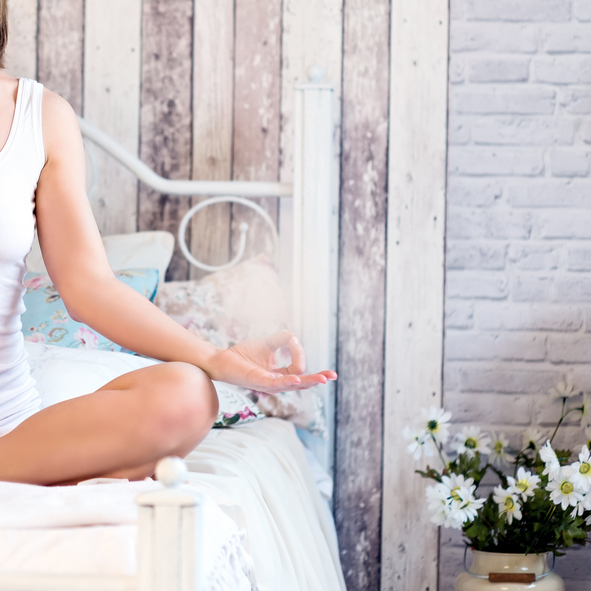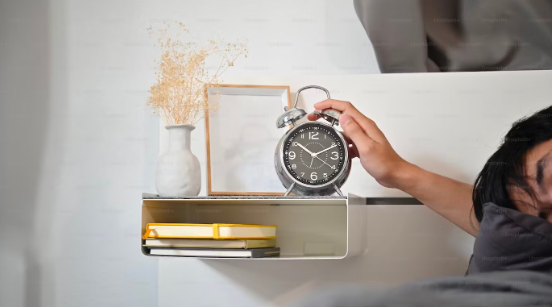Top Sleep Hacks

Author: Jonathan Warren
Not getting enough sleep, finding it hard to get to sleep, or not feeling refreshed even after you’ve slept? There are a number of reasons we fall out of our usual sleeping routines. Sometimes these problems simply go away by themselves, while in other cases it can be a symptom of another underlying issue.
Either way, you might want to try some of these tried-and-tested sleep hacks to enjoy a better night’s sleep – they’re all simple enough to do with little or no preparation.
 Get into a bedtime routine
However spontaneous you are during the day, having a bedtime routine pays off when it comes to sleep. Try to do the same things before bed every night: lay out your clothes ready for the morning, get into your PJs, read a couple of chapters of your book.
Before long, you’ll train yourself to associate these things with sleep and your mind will respond accordingly. Find out more about the perfect bedtime routine.
Exercise every day
If you find it hard to drop off in the evening, it may be because you’re not using enough energy during the day. Doctors recommend at least 30-45 minutes of vigorous activity per day – and as well as being good for your body, it will also help you enjoy some well-earned rest at night.
It’s best not to exercise too close to bedtime, due to the adrenaline buzz. Ideally you should leave at least three hours between your workout and getting into bed.
Go to sleep by 11pm
For many, 11pm is the sweet spot for a good night’s sleep – it’s the time when most people’s cortisol levels are at their lowest. Cortisol is a hormone the rises in the morning to help us wake up, generally peaking at around 10am to 11am, before gradually falling for the rest of the day.
If you regularly go to bed around midnight but find it hard to drift off, cortisol could be the culprit: try an earlier bedtime. Read more about how long you should sleep for.
Get into a bedtime routine
However spontaneous you are during the day, having a bedtime routine pays off when it comes to sleep. Try to do the same things before bed every night: lay out your clothes ready for the morning, get into your PJs, read a couple of chapters of your book.
Before long, you’ll train yourself to associate these things with sleep and your mind will respond accordingly. Find out more about the perfect bedtime routine.
Exercise every day
If you find it hard to drop off in the evening, it may be because you’re not using enough energy during the day. Doctors recommend at least 30-45 minutes of vigorous activity per day – and as well as being good for your body, it will also help you enjoy some well-earned rest at night.
It’s best not to exercise too close to bedtime, due to the adrenaline buzz. Ideally you should leave at least three hours between your workout and getting into bed.
Go to sleep by 11pm
For many, 11pm is the sweet spot for a good night’s sleep – it’s the time when most people’s cortisol levels are at their lowest. Cortisol is a hormone the rises in the morning to help us wake up, generally peaking at around 10am to 11am, before gradually falling for the rest of the day.
If you regularly go to bed around midnight but find it hard to drift off, cortisol could be the culprit: try an earlier bedtime. Read more about how long you should sleep for.
 Butterflies on lavender.
Use lavender oil
It’s long been thought that lavender can aid restful sleep, and recent research suggests it’s not just an old wives’ tale. Separate studies by the University of Southampton, Wesleyan University in Colorado and Baika Women’s University in Japan all found evidence that lavender oil can act as a mild sedative that promotes a better quality of sleep.
Even if you’re sceptical about natural remedies, it’s worth giving it a try. There’s also some scientific evidence that valerian root can be used to treat sleep disorders.
Try the 4-7-8 method
A deep breathing technique popularised by US wellness expert Dr Andrew Weil, the 4-7-8 method is based on pranayama – the Indian practice of controlling the breath in meditation.
It’s very simple to do: breathe in through your nose for four seconds, hold your breath for seven seconds, then slowly exhale through your mouth for eight seconds. Repeat for as long as you need to - before long, you should find yourself feeling more relaxed.
The technique is thought to mimic the breathing patterns of deep sleep, which may help you to drift off more easily.
Banish electronics before bed
This one is often repeated, but that’s because it’s true: the blue light from your smartphone or laptop is the enemy of good bed rest. It suppresses melatonin, the hormone that helps you get to sleep, essentially by telling your brain that it’s still daytime. Most experts recommend ditching all electronics with a screen, including TV, for at least an hour before bed.
Trouble falling asleep could mean that you experience sleep debt the following day – find out more about it here.
Images: ©iStock/Nickolya, ©iStock/Rike
Butterflies on lavender.
Use lavender oil
It’s long been thought that lavender can aid restful sleep, and recent research suggests it’s not just an old wives’ tale. Separate studies by the University of Southampton, Wesleyan University in Colorado and Baika Women’s University in Japan all found evidence that lavender oil can act as a mild sedative that promotes a better quality of sleep.
Even if you’re sceptical about natural remedies, it’s worth giving it a try. There’s also some scientific evidence that valerian root can be used to treat sleep disorders.
Try the 4-7-8 method
A deep breathing technique popularised by US wellness expert Dr Andrew Weil, the 4-7-8 method is based on pranayama – the Indian practice of controlling the breath in meditation.
It’s very simple to do: breathe in through your nose for four seconds, hold your breath for seven seconds, then slowly exhale through your mouth for eight seconds. Repeat for as long as you need to - before long, you should find yourself feeling more relaxed.
The technique is thought to mimic the breathing patterns of deep sleep, which may help you to drift off more easily.
Banish electronics before bed
This one is often repeated, but that’s because it’s true: the blue light from your smartphone or laptop is the enemy of good bed rest. It suppresses melatonin, the hormone that helps you get to sleep, essentially by telling your brain that it’s still daytime. Most experts recommend ditching all electronics with a screen, including TV, for at least an hour before bed.
Trouble falling asleep could mean that you experience sleep debt the following day – find out more about it here.
Images: ©iStock/Nickolya, ©iStock/Rike
 Get into a bedtime routine
However spontaneous you are during the day, having a bedtime routine pays off when it comes to sleep. Try to do the same things before bed every night: lay out your clothes ready for the morning, get into your PJs, read a couple of chapters of your book.
Before long, you’ll train yourself to associate these things with sleep and your mind will respond accordingly. Find out more about the perfect bedtime routine.
Exercise every day
If you find it hard to drop off in the evening, it may be because you’re not using enough energy during the day. Doctors recommend at least 30-45 minutes of vigorous activity per day – and as well as being good for your body, it will also help you enjoy some well-earned rest at night.
It’s best not to exercise too close to bedtime, due to the adrenaline buzz. Ideally you should leave at least three hours between your workout and getting into bed.
Go to sleep by 11pm
For many, 11pm is the sweet spot for a good night’s sleep – it’s the time when most people’s cortisol levels are at their lowest. Cortisol is a hormone the rises in the morning to help us wake up, generally peaking at around 10am to 11am, before gradually falling for the rest of the day.
If you regularly go to bed around midnight but find it hard to drift off, cortisol could be the culprit: try an earlier bedtime. Read more about how long you should sleep for.
Get into a bedtime routine
However spontaneous you are during the day, having a bedtime routine pays off when it comes to sleep. Try to do the same things before bed every night: lay out your clothes ready for the morning, get into your PJs, read a couple of chapters of your book.
Before long, you’ll train yourself to associate these things with sleep and your mind will respond accordingly. Find out more about the perfect bedtime routine.
Exercise every day
If you find it hard to drop off in the evening, it may be because you’re not using enough energy during the day. Doctors recommend at least 30-45 minutes of vigorous activity per day – and as well as being good for your body, it will also help you enjoy some well-earned rest at night.
It’s best not to exercise too close to bedtime, due to the adrenaline buzz. Ideally you should leave at least three hours between your workout and getting into bed.
Go to sleep by 11pm
For many, 11pm is the sweet spot for a good night’s sleep – it’s the time when most people’s cortisol levels are at their lowest. Cortisol is a hormone the rises in the morning to help us wake up, generally peaking at around 10am to 11am, before gradually falling for the rest of the day.
If you regularly go to bed around midnight but find it hard to drift off, cortisol could be the culprit: try an earlier bedtime. Read more about how long you should sleep for.
 Butterflies on lavender.
Use lavender oil
It’s long been thought that lavender can aid restful sleep, and recent research suggests it’s not just an old wives’ tale. Separate studies by the University of Southampton, Wesleyan University in Colorado and Baika Women’s University in Japan all found evidence that lavender oil can act as a mild sedative that promotes a better quality of sleep.
Even if you’re sceptical about natural remedies, it’s worth giving it a try. There’s also some scientific evidence that valerian root can be used to treat sleep disorders.
Try the 4-7-8 method
A deep breathing technique popularised by US wellness expert Dr Andrew Weil, the 4-7-8 method is based on pranayama – the Indian practice of controlling the breath in meditation.
It’s very simple to do: breathe in through your nose for four seconds, hold your breath for seven seconds, then slowly exhale through your mouth for eight seconds. Repeat for as long as you need to - before long, you should find yourself feeling more relaxed.
The technique is thought to mimic the breathing patterns of deep sleep, which may help you to drift off more easily.
Banish electronics before bed
This one is often repeated, but that’s because it’s true: the blue light from your smartphone or laptop is the enemy of good bed rest. It suppresses melatonin, the hormone that helps you get to sleep, essentially by telling your brain that it’s still daytime. Most experts recommend ditching all electronics with a screen, including TV, for at least an hour before bed.
Trouble falling asleep could mean that you experience sleep debt the following day – find out more about it here.
Images: ©iStock/Nickolya, ©iStock/Rike
Butterflies on lavender.
Use lavender oil
It’s long been thought that lavender can aid restful sleep, and recent research suggests it’s not just an old wives’ tale. Separate studies by the University of Southampton, Wesleyan University in Colorado and Baika Women’s University in Japan all found evidence that lavender oil can act as a mild sedative that promotes a better quality of sleep.
Even if you’re sceptical about natural remedies, it’s worth giving it a try. There’s also some scientific evidence that valerian root can be used to treat sleep disorders.
Try the 4-7-8 method
A deep breathing technique popularised by US wellness expert Dr Andrew Weil, the 4-7-8 method is based on pranayama – the Indian practice of controlling the breath in meditation.
It’s very simple to do: breathe in through your nose for four seconds, hold your breath for seven seconds, then slowly exhale through your mouth for eight seconds. Repeat for as long as you need to - before long, you should find yourself feeling more relaxed.
The technique is thought to mimic the breathing patterns of deep sleep, which may help you to drift off more easily.
Banish electronics before bed
This one is often repeated, but that’s because it’s true: the blue light from your smartphone or laptop is the enemy of good bed rest. It suppresses melatonin, the hormone that helps you get to sleep, essentially by telling your brain that it’s still daytime. Most experts recommend ditching all electronics with a screen, including TV, for at least an hour before bed.
Trouble falling asleep could mean that you experience sleep debt the following day – find out more about it here.
Images: ©iStock/Nickolya, ©iStock/Rike



